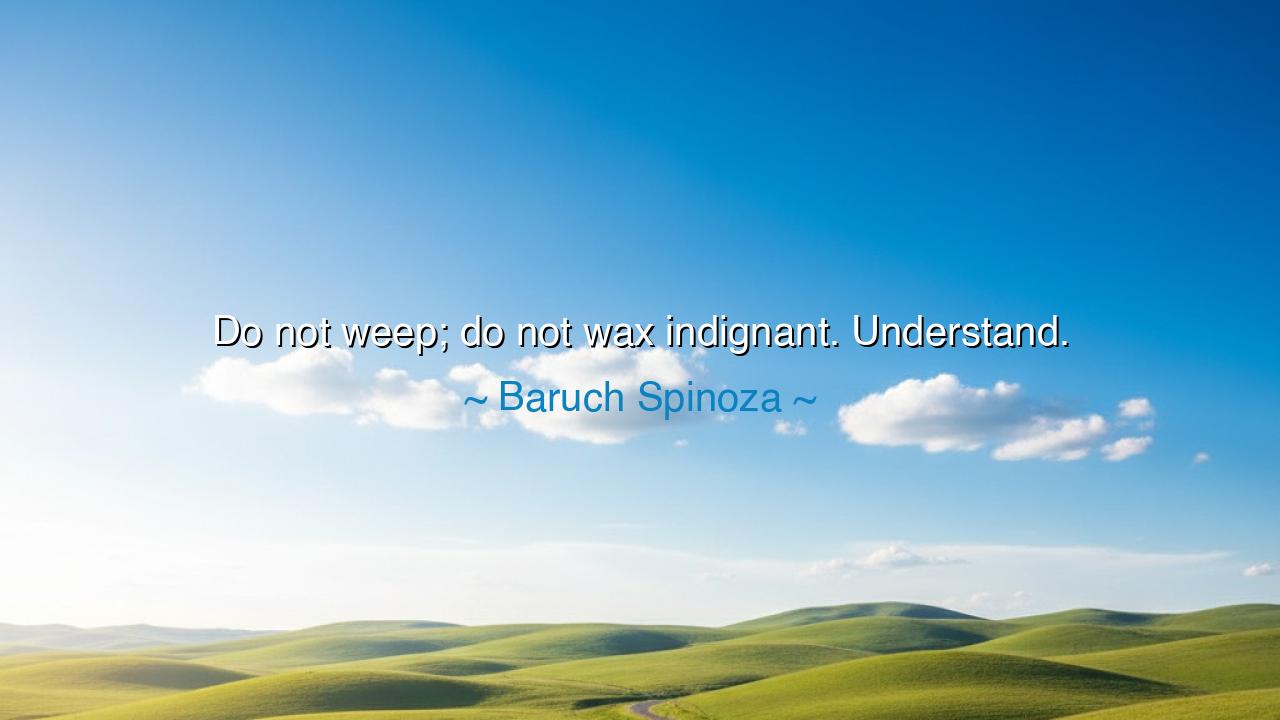
Do not weep; do not wax indignant. Understand.






The words of Baruch Spinoza, “Do not weep; do not wax indignant. Understand,” are a call to wisdom deeper than sorrow, higher than anger. They summon the soul away from the turbulence of raw emotion into the clear sky of reason. For tears, though human, cannot alter the course of truth; and rage, though fiery, cannot shape reality to our will. To understand—this alone brings power, peace, and mastery over life’s storms.
Weeping is the response of despair, the cry of one who feels powerless before the weight of existence. Indignation is the outburst of the offended heart, lashing against injustice but often blind in its fury. Both have their place, yet both can cloud vision. Spinoza, the philosopher who sought to see life through the lens of eternal order, teaches us that the higher path is to seek understanding. To understand is not to deny emotion, but to rise above it, to see the world as it is rather than through the smoke of passion.
Consider the story of Nelson Mandela. Imprisoned for twenty-seven years, stripped of freedom, subjected to cruelty, he might have drowned in tears or burned in anger. Yet Mandela chose a higher road: he sought to understand his oppressors, to grasp the roots of their fear and prejudice. In that understanding, he found not only wisdom but power. When at last he was freed, he did not emerge consumed by vengeance; he emerged prepared to heal a nation. Without understanding, South Africa might have descended into endless civil war. Through understanding, it found a path toward reconciliation.
This is the heroic strength Spinoza speaks of—not the might of the sword or the loudness of the voice, but the quiet majesty of comprehension. For to understand is to gain mastery over both the world and the self. The man who understands why injustice exists is better equipped to dismantle it than the man who merely curses it. The one who understands the roots of sorrow may heal, while the one who only weeps remains trapped.
Do not mistake this teaching for coldness. Spinoza does not demand that we feel nothing. Rather, he urges us to let emotion be the spark, not the master. Tears may fall, but they must give way to insight. Anger may rise, but it must be tempered by knowledge. Without understanding, both sorrow and fury are like waves that crash but achieve nothing. With understanding, they are transformed into rivers that carve paths of change.
The lesson is clear: when confronted with suffering, betrayal, or confusion, do not linger too long in grief or rage. Ask instead, “Why is this so? What can be learned? How may I act with wisdom?” Understanding turns pain into purpose, injustice into action, confusion into clarity. It is the philosopher’s way, the leader’s strength, the healer’s gift.
So I say to you, children of tomorrow: let not your heart be ruled by weeping, nor your hand by rage. Let your mind be your guide, for through understanding you will see farther than your enemies, endure longer than your sorrows, and rise higher than your circumstances. Do not weep; do not wax indignant. Understand.
If you would practice this truth, begin with the conflicts of your own life. When anger stirs, pause and ask what lies beneath it. When grief overwhelms, seek the lesson hidden within the loss. Each time you replace passion with insight, you sharpen the blade of wisdom. In time, you will walk as one who no longer thrashes blindly against the world, but as one who comprehends it—and in that comprehension, commands it.






AAdministratorAdministrator
Welcome, honored guests. Please leave a comment, we will respond soon